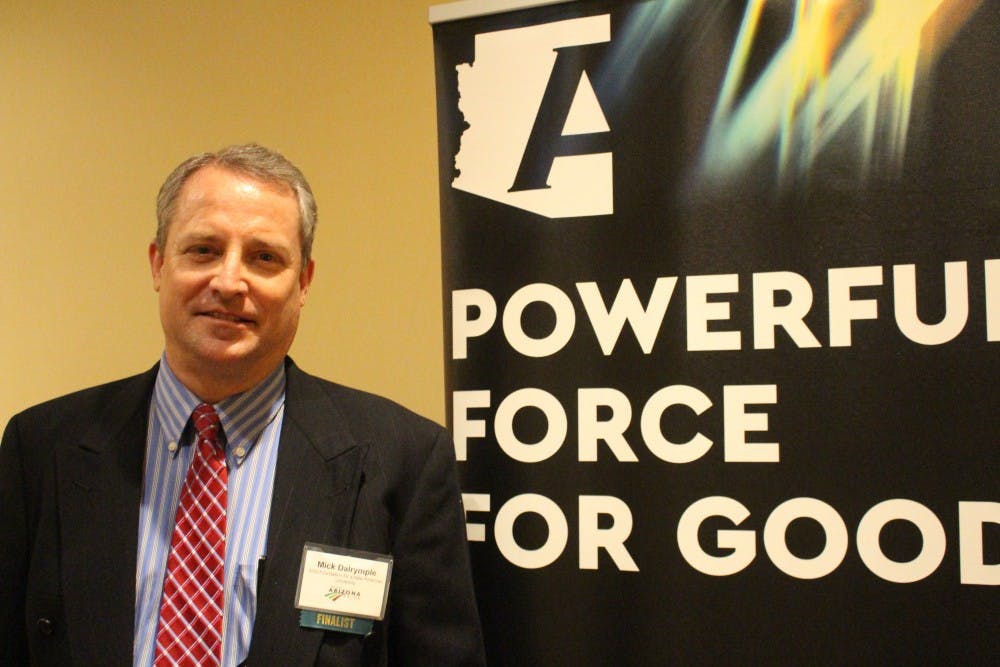ASU, competing against contestants including the City of Phoenix, made the finals at the New Arizona Prize Water Innovation Challenge, finishing in the top five. Although ASU was the only university in the finals, the team fell just short of a winning the $250,000 grant.
ASU Director of Sustainability Michael Dalrymple said that although ASU didn’t win the challenge, he felt the Pima County Regional Wastewater Reclamation department, the team that won the challenge by making craft beer from reclaimed water, was deserving.
“I think it's hard to be depressed about losing to that team,” Dalrymple said. “What they had talked about is that the technologies are all there. It was public perception issues. That project directly addresses the public perception there. All water is recyclable. If you could illustrate that to people over a beer, that’s a pretty big deal.”
Waterworks, a project focusing on reclaiming wastewater for reuse, is a collaborative effort between ASU, the city of Tempe, and Catellus Development Corp. The Waterworks team borrowed much of the system from Waterhub, a water recycling system at Emory University in Atlanta. The team's goal is to increase the amount of reclaimed water usage on campus.
With the recycling technology, ASU can create potable water and decrease water usage from the processing plants ASU currently uses.
JoEllen Alberhasky, Waterworks’ project manager, said repurposing and modifying Emory’s model will allow the model to be used in more regions.
“We’re talking about taking that project and making it three times larger in a southwestern climate as opposed to a southeastern climate, where our water rates are 75 percent lower than in Atlanta,” she said. “It’s a very different kind of application, but it's the type of application that can be used in small rural communities. This is the kind of project that can have some application for developing countries.”
Alberhasky said the model can be an effective and flexible way to to repurpose water.
“On the Tempe campus, 36 percent of water goes to central plants that are designed to heat and cool the campus,” she said. “That’s a pretty large piece of your water use to be able to turn around into a resource. The water could be used on irrigation or with toilets. The plant we’re proposing to build will be processing 1.5 million gallons a day.”
The project has been more than a year in the making.
“We’ve been working with faculty members for over a year,” she said. “And this opportunity to apply to the Arizona Water Innovation Challenge came up. We thought this was a great match for the award because they’re looking for awards where it isn't just talk. You really save water.”
Steve Seleznow, president of the Arizona Community Foundation, said ASU’s project displays collaboration, an important part of sustainable practices.
“ASU is a large city,” he said. “It's larger than many municipalities in Arizona, and their program involves the city of Tempe. They have a unique set of sustainability issues facing the University just as a large institution would. They have a unique solution that really compelled the judges to make them a finalist.”
Arizona Community Foundation Brand and Impact Officer Megan Brownell also said that what made ASU’s project different was the Waterwork’s level of collaboration.
“The judges really liked the collaborative nature of the project," Brownell said. "The really felt it was scalable, sustainable, and it’s a promising concept around reuse."
Despite losing the grant opportunity, Dalrymple said the team still plans to move forward with the project.
“Next, we are intending to hire a consultant who will do a survey of the different technology options that are out there,” he said. “(We're) talking internally about funding sources. We’re going to start the due dilligence, but we’ll just have to start at a grassroots level. It'll take a little longer.”
Reach the reporter at Emmillma@asu.edu or follow @Millmania1 on Twitter.
Like The State Press on Facebook and follow @statepress on Twitter.




